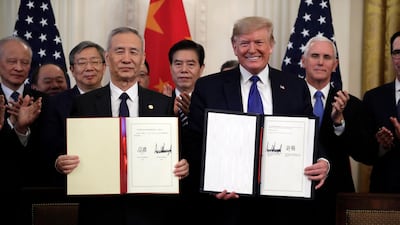The global economy is set to recover in 2020 after recording its slowest pace of growth in a decade last year, however trade tensions, geopolitical escalations and financial turmoil could derail the revival, the United Nations said.
The world economy is expected to expand 2.5 per cent in 2020, if downside risks are kept at bay, a slight uptick from the 2.3 per cent recorded last year, according to a January 16 report by the United Nations Conference on Trade and Development.
“These risks could inflict severe and long-lasting damage on development prospects," UN Secretary-General António Guterres warned. "They also threaten to encourage a further rise in inward-looking policies, at a point when global co-operation is paramount.”
The US and China signed "Phase One" of a broader trade agreement on January 15, marking a truce in an 18-month spat between the world's two biggest economies that hit the global economy, roiled markets and clouded the business outlook. The last few weeks also saw an escalation in geopolitical tensions between the US and Iran, as the Islamic Republic vowed "tough revenge" over the killing of its top military commander Qassem Suleimani in Baghdad.
In a downside scenario, global economic growth could slow to just 1.8 per cent this year, according to UNCTAD.
"A prolonged weakness in global economic activity may cause significant setbacks for sustainable development, including the goals to eradicate poverty and create decent jobs for all," the report said. "At the same time, pervasive inequalities and the deepening climate crisis are fuelling growing discontent in many parts of the world."
The UN body called for a "more balanced policy mix" to stimulate economic growth while moving towards greater social inclusion, gender equality and environmentally sustainable production. It noted that over-reliance on monetary policy is insufficient to revive growth and entails significant costs.
The US economy is projected to slow to 1.7 per cent in 2020 from 2.2 per cent in 2019, given persistent policy uncertainty, weak business confidence and waning fiscal stimulus, the UNCTAD said.
China's gross domestic product growth is forecast to dip gradually to 6 per cent in 2020 and 5.9 per cent in 2021 from 6.1 per cent in 2019, supported by more "accommodative" monetary and fiscal policies.
In the European Union, where manufacturing will still be held back by global uncertainty — although this will be partially offset by steady growth in private consumption — the bloc will see a slight rise in GDP growth to 1.6 per cent in 2020 from 1.4 per cent in 2019.
Meanwhile, East Asia remains the world’s fastest growing region and the largest contributor to global growth, despite significant headwinds, the report said.


